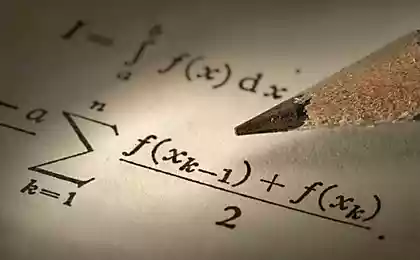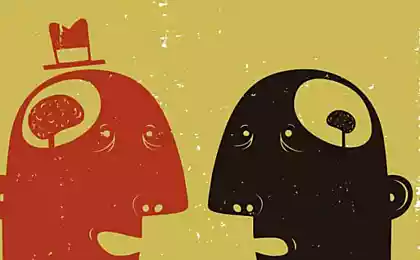713
What prevents us to be objective: 11 errors of human thought
Logic lovushkiKognitivnye distortion - a systematic errors in human thinking, a kind of logical trap. In certain situations, we tend to act in irrational patterns, even when we think that we proceed from common sense. "Theory and Practice" was chosen by 11 common pitfalls that deprive us of objectivity.

Illusion kontrolyaLyudi tend to overestimate their influence on events in the successful outcome of which they are interested. This phenomenon was discovered in 1975 by American psychologist Ellen Langer in the course of experiments with lottery tickets. Participants in the experiment were divided into two groups: the first group of people could choose their own lottery tickets, and the members of the second group were given no right to choose. 2 days before the draw experimenters offered to participants of both groups to exchange your ticket for another new lottery with more chances to win.
Obviously, the proposal has been beneficial, but those members, who are themselves elected tickets, in no hurry to part with them - as if their ticket is a personal choice could affect the probability of winning.
Preference zero riskaPredstavte that you have a choice: to reduce the small risk to the full zero or significantly reduce a high risk. For example, to reduce to zero the crash completely or drastically reduce the number of car accidents. What would you choose?
Based on these statistics, it would be better to choose the second option: the mortality rate of aircraft accidents is much lower than the death rate from motor vehicle accidents - with the result that such a choice would save more lives. Yet studies show that most people choose the first option: zero risk at least in some area looks like a soothing, even if your chances of becoming a victim of a plane crash are negligible.
Selective vospriyatieDopustim, you do not trust GM. And if this topic is of great concern to you, you probably read news articles about genetically modified organisms. While reading, you are more and more convinced that right: the danger is obvious. But here's the rub - it is likely that you are paying much more attention to the news, podkpelyayuschim your point of view, than the arguments in favor of GMOs. So, you lose objectivity. This tendency of people to pay attention to the information that is consistent with their expectations, and ignore everything else, called selective perception.
Error igrokaOshibka players often lurks gamblers. Many of them are trying to find the relationship between the probability of the desired outcome of a random event and its previous outcomes. The simplest example - tossing a coin: if nine consecutive falls "tails," most people would be the next time put on the "eagle" as if too frequent loss of "tails" increases the probability of loss. But it is not so: in fact the odds remain the same - 50 / 50.
Bias vyzhivshegoEtu logical trap discovered during the Second World War, but it can be caught in peacetime. During the war, the US military leadership has decided to reduce the number of casualties among the bombers and went down the order: as a result of the fighting to find out on what parts of the aircraft necessary to strengthen the protection. We began to study the aircraft returned and found many holes in the wings and tail - these parts, and it was decided to strengthen. At first glance it looked quite logical - but fortunately, the military has come to the aid of the supervisory statistician Abraham Wald. He explained to them that they almost made a fatal mistake. It actually holes in the aircraft returned carrying information on their strong areas and not for the weak. Planes, "wounded" in other places - for example, the engine or fuel tank - simply do not return from the battlefield.
On the principle of "the wounded survivors," is to think now, when we're going to jump to conclusions on the basis of asymmetric information for any two groups.
Read more on the website «T & P»
via theoryandpractice.ru/posts/7357-chto-meshaet-nam-byt-obektivnymi-10-kognitivnykh-iskazheniy

Illusion kontrolyaLyudi tend to overestimate their influence on events in the successful outcome of which they are interested. This phenomenon was discovered in 1975 by American psychologist Ellen Langer in the course of experiments with lottery tickets. Participants in the experiment were divided into two groups: the first group of people could choose their own lottery tickets, and the members of the second group were given no right to choose. 2 days before the draw experimenters offered to participants of both groups to exchange your ticket for another new lottery with more chances to win.
Obviously, the proposal has been beneficial, but those members, who are themselves elected tickets, in no hurry to part with them - as if their ticket is a personal choice could affect the probability of winning.
Preference zero riskaPredstavte that you have a choice: to reduce the small risk to the full zero or significantly reduce a high risk. For example, to reduce to zero the crash completely or drastically reduce the number of car accidents. What would you choose?
Based on these statistics, it would be better to choose the second option: the mortality rate of aircraft accidents is much lower than the death rate from motor vehicle accidents - with the result that such a choice would save more lives. Yet studies show that most people choose the first option: zero risk at least in some area looks like a soothing, even if your chances of becoming a victim of a plane crash are negligible.
Selective vospriyatieDopustim, you do not trust GM. And if this topic is of great concern to you, you probably read news articles about genetically modified organisms. While reading, you are more and more convinced that right: the danger is obvious. But here's the rub - it is likely that you are paying much more attention to the news, podkpelyayuschim your point of view, than the arguments in favor of GMOs. So, you lose objectivity. This tendency of people to pay attention to the information that is consistent with their expectations, and ignore everything else, called selective perception.
Error igrokaOshibka players often lurks gamblers. Many of them are trying to find the relationship between the probability of the desired outcome of a random event and its previous outcomes. The simplest example - tossing a coin: if nine consecutive falls "tails," most people would be the next time put on the "eagle" as if too frequent loss of "tails" increases the probability of loss. But it is not so: in fact the odds remain the same - 50 / 50.
Bias vyzhivshegoEtu logical trap discovered during the Second World War, but it can be caught in peacetime. During the war, the US military leadership has decided to reduce the number of casualties among the bombers and went down the order: as a result of the fighting to find out on what parts of the aircraft necessary to strengthen the protection. We began to study the aircraft returned and found many holes in the wings and tail - these parts, and it was decided to strengthen. At first glance it looked quite logical - but fortunately, the military has come to the aid of the supervisory statistician Abraham Wald. He explained to them that they almost made a fatal mistake. It actually holes in the aircraft returned carrying information on their strong areas and not for the weak. Planes, "wounded" in other places - for example, the engine or fuel tank - simply do not return from the battlefield.
On the principle of "the wounded survivors," is to think now, when we're going to jump to conclusions on the basis of asymmetric information for any two groups.
Read more on the website «T & P»
via theoryandpractice.ru/posts/7357-chto-meshaet-nam-byt-obektivnymi-10-kognitivnykh-iskazheniy
























